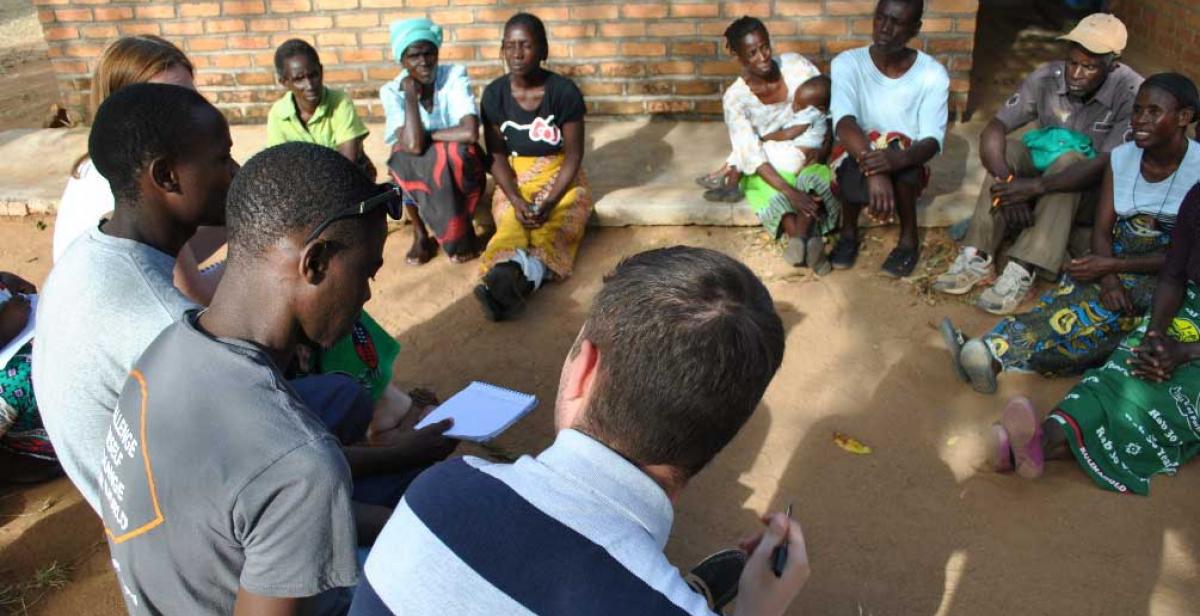After a long drive we found ourselves at Tilimbike Support Group in a remote part of Nkhotakota district. The group was composed of two separate sections, an adult support group as well as a children’s therapy group. We received the customary warm welcome from our hosts, with a song and dance putting an immediate smile on all of our faces, before personal introductions from the group members and the Progressio volunteers.
The purpose of our visit was to monitor and evaluate the training that members of the support group had received from COWLHA with help from the previous cycle of Progressio volunteers, so we proceeded to sit the adult support group down for a chat to find out what we could from them. The group were very forthcoming and eager to talk to us about their experiences of living with HIV and also about how being a member of the support group had given them a new lease of life following their diagnosis. They told us that they had formed the support group as they wanted to learn more about positive living, in addition to agricultural training, so that they would be able to look after themselves better and support themselves financially. This was very pleasing to hear, as it could have been all too easy for them to let their HIV positive status become a self-fulfilling prophecy and reflect the discrimination and stigma to which some HIV positive people are subjected. , But these support group members were clearly not going to let it affect their quality of life and they were keen to take the chance to improve their situation.
As we began to discuss the subject of COWLHA training it became apparent that none of the community members who had received the training were present at the support group. However, the support group members told us that the knowledge had been shared with them, especially concerning how to reduce stress, how to end discrimination, how to prevent family violence and sexual health rights. Another positive indicator of change following COWLHA training concerned the way that the HIV positive community are treated by their village leaders. Previously they were treated disrespectfully and differently from others, but this is now improving and there is more respect towards HIV positive people. They are being allowed access to agricultural subsidies that they were previously denied as they were told that their disease meant they could not be productive. They also expressed to us that the Peer Educator training led by COWLHA had been a success and had taught them a lot about the importance of a balanced diet and regular exercise. Pleasingly, the support group explained that since COWLHA training had been undertaken they had received additional support from religious leaders as well as from members of the church community. Before the training in 2013 there was less proactive support for people with HIV but now the church leaders and community offer additional prayers and advice, and there is no discrimination against people with a positive HIV status at all.
Towards the end of the session one of the members who had received COWLHA training, Pearson, arrived. He indicated that the COWLHA training had improved his life greatly which was fantastic to hear. He explained that due to his HIV positive status his wife’s family didn’t accept him and that there would be huge quarrels if he ever visited their house. However, following training by COWLHA that he attended with his wife, his family life has improved and they are much more supportive and accepting of his status. This was a wonderful success story and a great example of how COWLHA’s training is working to improve the lives of people with HIV.
We then wanted to find out what else the support group would like to learn about in order to improve their lives. They made it clear that workshops on positive living would be extremely beneficial because they have not had all their training on nutrition and exercise. Additionally, although access to the agricultural coupons has improved there are still not enough subsidies once they have been divided up. Also, they have little knowledge of fertiliser alternatives which has made it difficult for them to benefit from farming in practice. These answers helped us to form an idea of what we could possibly do in future support group sessions to help the members achieve a better quality of life.
All in all, I think it is safe to say that our visit to Tilimbike was extremely useful and informative, and enabled us to monitor and evaluate how successful COWLHA’s training was. It helped us to form a clear idea of the areas in which the group would like additional support, and it is our aim to provide this in the forthcoming sessions.
Until next time.
Written by ICS volunteer Jake Towey



